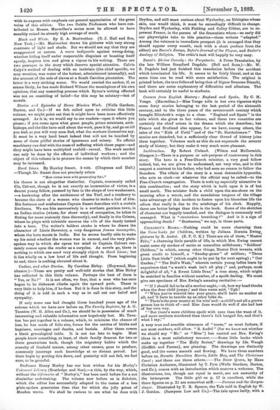"How virtue wars with persecuting rata,"
his theme is not altogether dissimilar. Captain, commonly called -Cis, Calvert, though he is not exactly an incarnation of virtue, is a decent young fellow, pursued by fate in the shape of two weaknesses, —a hankering after the excitement of the Turf, and a tendency to become the slave of a woman who chooses to make a fool of him. His fortunes and misfortunes Captain Smart describes with a certain liveliness. We see him successively in a northern garrison town, in an Indian station (where, for sheer want of occupation, he takes to flirting far more zealously than discreetly), and finally in the Crimea, where he plays with tolerable success the rule of the dandy turned into a hero. The writer's boldest stroke is where he draws the character of Lizzie Daventry, a very dangerous femme incomprise, whom the hero meets in India. But he seems hardly able to make np his mind whether the woman was in earnest, and the very plain- spoken way in which she opens her mind to Captain Calvert cer- tainly comes upon the reader as a surprise. As novels go, there is nothing to which one need very strongly object in Hard Lines ; but it lies wholly on a low level of life and thought. From beginning to end, there is nothing elevated about it.






































 Previous page
Previous page